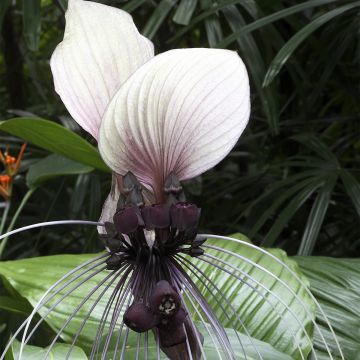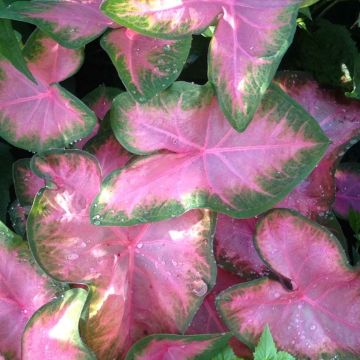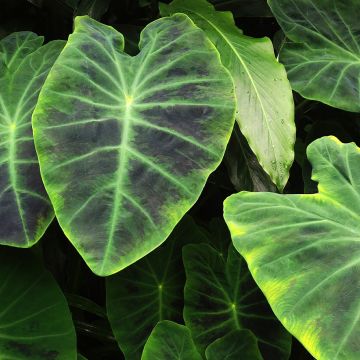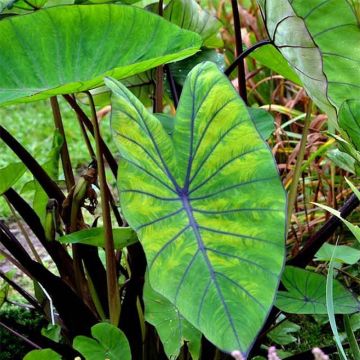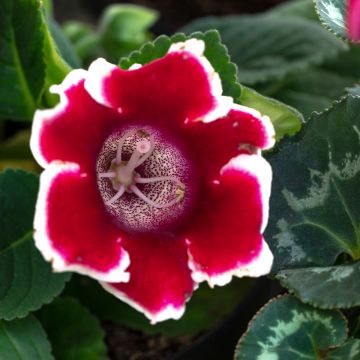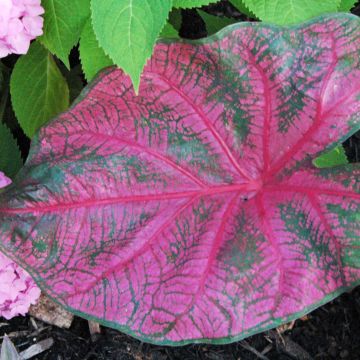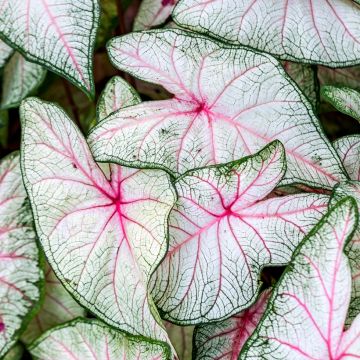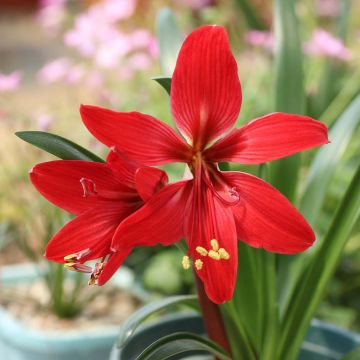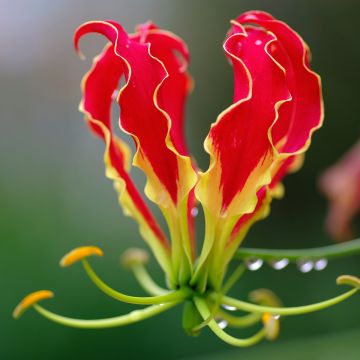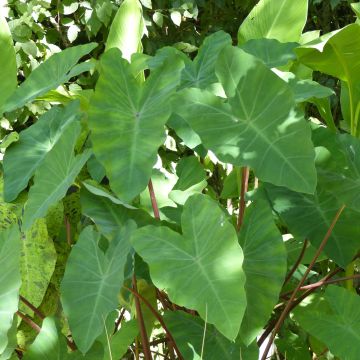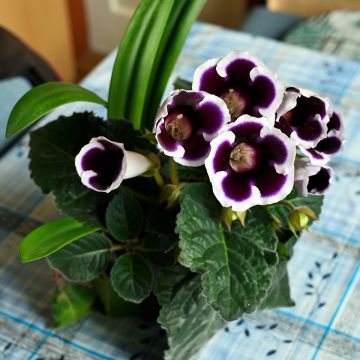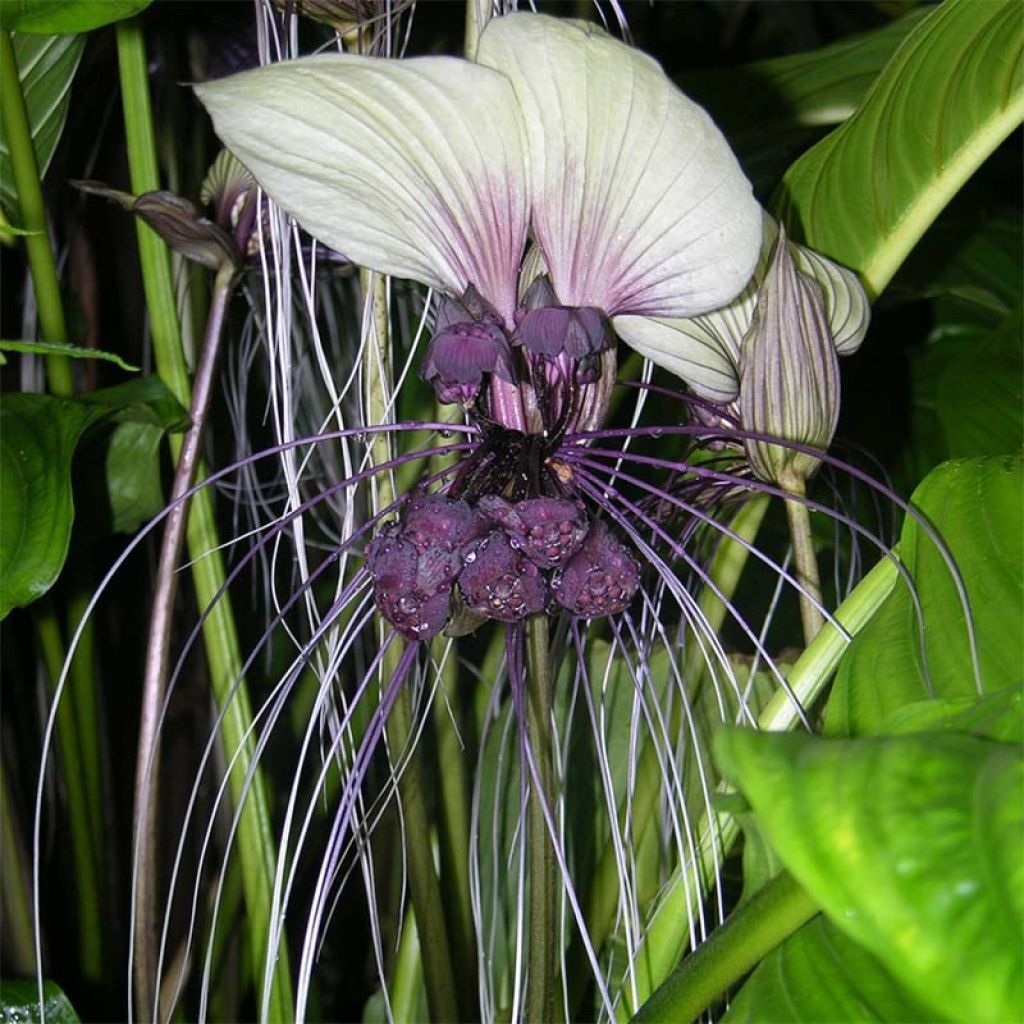

Tacca integrifolia
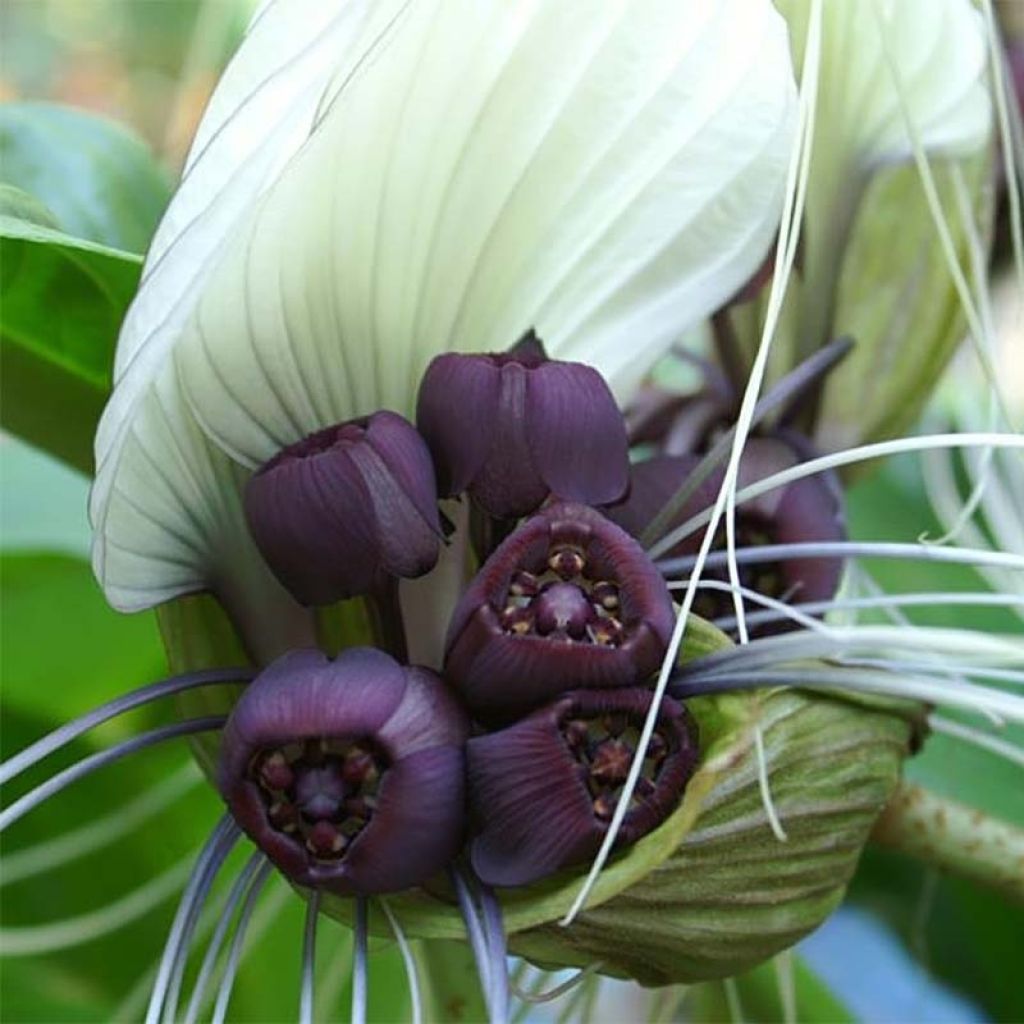

Tacca integrifolia
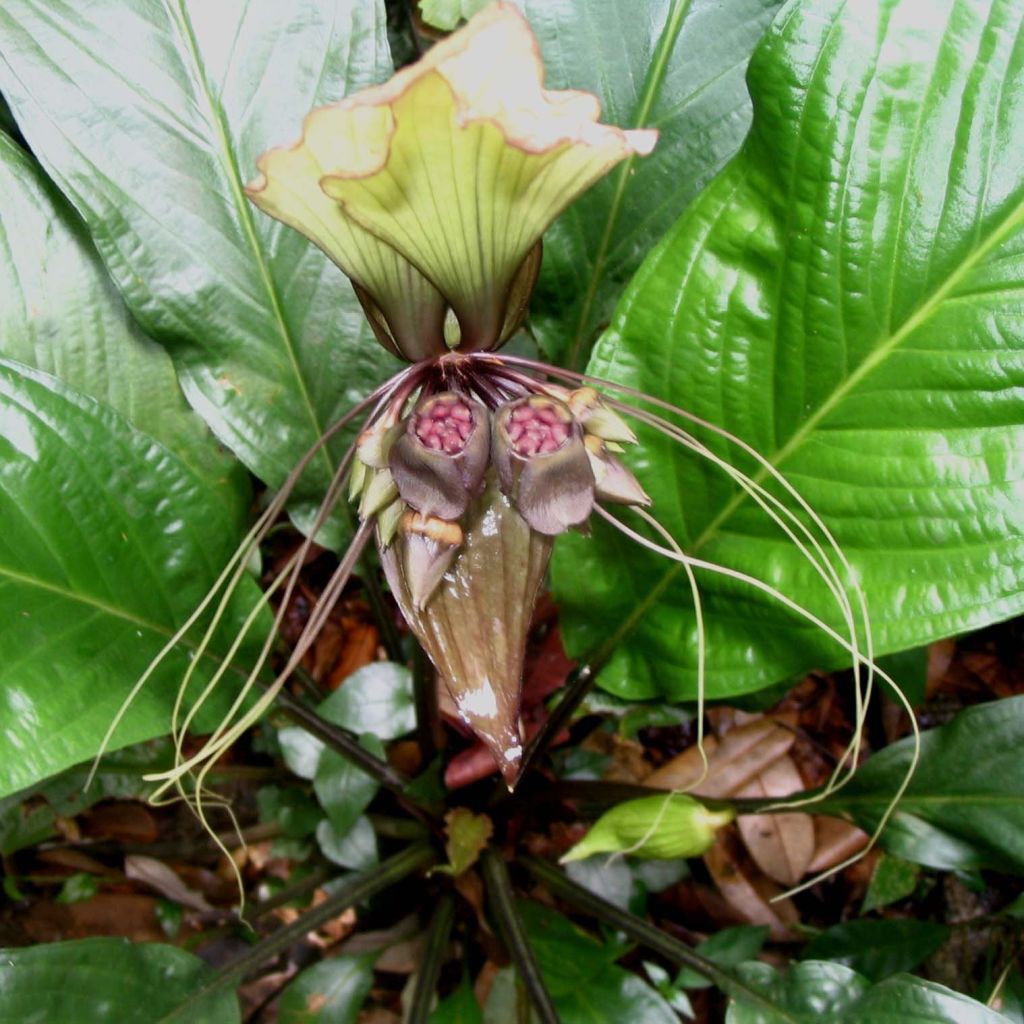

Tacca integrifolia
Tacca integrifolia
Tacca integrifolia
White Bat Flower, Giant Bat Flower
Another attempt in the greenhouse but same disappointing result, a pity.
Malorie, 08/10/2024
This plant carries a 6 months recovery warranty
More information
We guarantee the quality of our plants for a full growing cycle, and will replace at our expense any plant that fails to recover under normal climatic and planting conditions.
From €5.90 for pickup delivery and €6.90 for home delivery
Express home delivery from €8.90.
Does this plant fit my garden?
Set up your Plantfit profile →
Description
Tacca integrifolia, commonly known as the White Bat Flower, is even more impressive than its close relative, Tacca chantrieri. This large species produces an impressive flower in the summer, with large white bracts veined with green, adorned with small dark pendulous flowers and very long purple and white filaments. This majestic inflorescence is borne on a stem emerging from a tuft of lush, dark green foliage. Fascinating, it is a plant native to the tropical forests of Asia that should be cultivated in a veranda or warm greenhouse with a humid atmosphere, in a very bright location, but without direct sunlight.
Tacca integrifolia belongs to the family Taccaceae, which consists of the only genus Tacca. It is a rhizomatous perennial species native to Bhutan, Bangladesh, Vietnam, and Malaysia. In the wild, it is found growing in rainforests, on acidic and humus-rich soil, in a highly humid environment. Under good growing conditions, it reaches a height of 1.20m (4ft) when flowering, with foliage reaching 80cm (32in) in height.
The plant develops from thick rhizomes. It forms a clump of basal leaves, borne on 40cm (16in) long petioles, with entire, elongated ovate laminae measuring up to 80cm (32in) in length and 25cm (10in) in width. The leaves are glabrous, bright green and shiny, with visible veins. In our climates, flowering occurs from June to August. Only plants aged 2 or 3 years produce inflorescences. This "bat flower" gets its name from its unique inflorescence, which resembles the small mammal in silhouette. The flowers are dark purple, consisting of 5 petals, grouped in clusters (up to 25 flowers) in the centre of four reddish-brown bracts, two of which, in the outer position, are particularly developed. These two bracts are white with green veins, often tinged with purple at the base. Each flower pedicel produces very long trailing filaments, 35cm (14in) in length, transitioning from purple to white, forming a shooting star's tail. The fruits are berries that contain numerous small seeds.
The White Bat Flower is a plant for experienced gardeners, a curiosity to be admired up close, protected from cold and scorching sun, in a heated and humid greenhouse or conservatory, without direct sunlight. It boasts beautiful foliage and offers one of the most interesting flowers in the plant kingdom. As such, it can only inspire fascination and interest in those who contemplate it. However, it can sometimes be temperamental and demanding in terms of growing conditions. When it is happy, this plant develops, flowers abundantly, and even produces offshoots. When something is lacking, it slowly weakens and eventually disappears. Unfortunately, the only way to know if you can provide it with good growing conditions is through trial and error. It is important to keep in mind that this plant originates from hot and humid tropical areas of Asia and experiences some dryness during its dormant period in winter in our latitudes.
Report an error about the product description
Tacca integrifolia in pictures
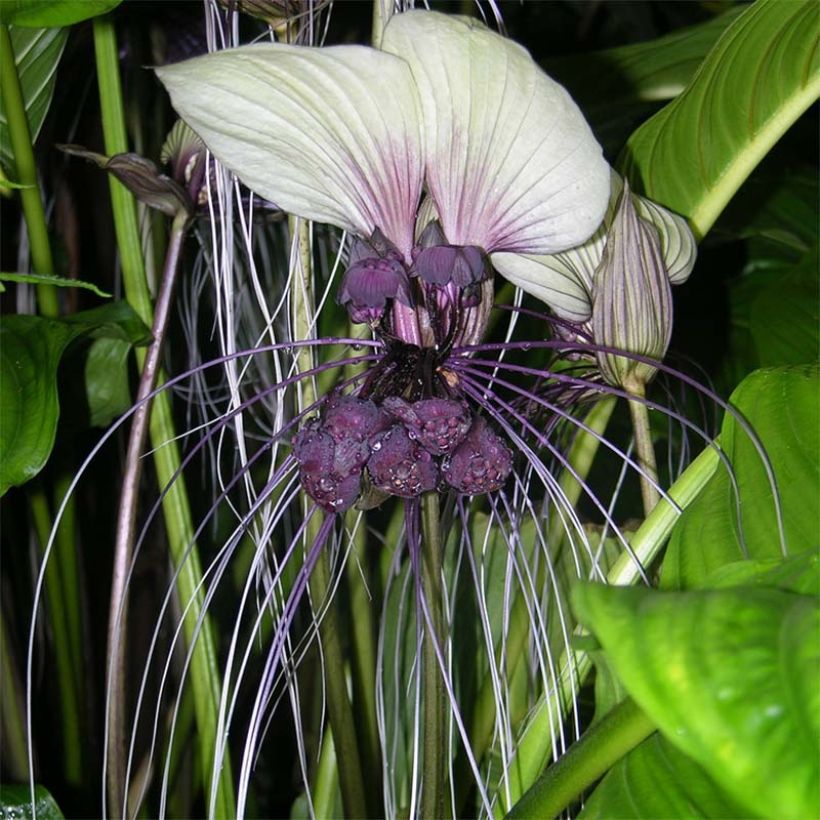

Plant habit
Flowering
Foliage
Botanical data
Tacca
integrifolia
Taccaceae
White Bat Flower, Giant Bat Flower
Southeast Asia
Other Tacca - Bat plant
Planting and care
The best period to plant Tacca integrifolia is the end of winter, in March. Place the rootstock in a 20cm (8in) diameter pot, perforated at the bottom, in a highly draining mixture, slightly acidic, preferably based on peat, perlite, and peaty and fibrous bark compost. A mixture composed of one-third leaf compost, one-third crushed pine bark, and one-third coconut fibre will be perfectly suitable. The quality of the substrate is a determining factor to succeed in growing this strange plant. During the growth season (from spring to the end of summer), the plants will need to be regularly watered with non-calcareous rainwater at room temperature. The substrate must be well-drained and regularly enriched with a fertilizer for peaty soil plants, as it is nutrient-poor. Ideally, repot every year, or every 2 years. Frequently mist the foliage with rainwater to maintain a good level of humidity and thus avoid the development of red spider mites that appreciate dry and warm atmospheres. Give very little water in winter and no fertilizer to respect a dormancy period of approximately 2 months and keep the plant at a temperature of 15-18°C (59-64.4°F) (the plant can perish at 12°C (53.6°F)) in winter. Maintain a temperature of 25-29°C (77-84.2°F) during summer.
These plants require peaty but not waterlogged soil, bright shade, and a humid and mild atmosphere, just like certain orchids.
To understand the optimal growing conditions of the Bat Flower, it can be useful to know the climate of its country of origin:
Myanmar, its country of origin, has three seasons. A temperate season from October to February with an average temperature range between 20 and 24 degrees (68 and 75.2°F), a hot season from March to May with temperatures ranging from 30 to 35 degrees (86 to 95°F), and finally a rainy season from June to September with temperatures between 25 and 30 degrees (77 and 86°F).
Planting period
Intended location
Care
-
, onOrder confirmed
Reply from on Promesse de fleurs
Bulbs for the home
Haven't found what you were looking for?
Hardiness is the lowest winter temperature a plant can endure without suffering serious damage or even dying. However, hardiness is affected by location (a sheltered area, such as a patio), protection (winter cover) and soil type (hardiness is improved by well-drained soil).

Photo Sharing Terms & Conditions
In order to encourage gardeners to interact and share their experiences, Promesse de fleurs offers various media enabling content to be uploaded onto its Site - in particular via the ‘Photo sharing’ module.
The User agrees to refrain from:
- Posting any content that is illegal, prejudicial, insulting, racist, inciteful to hatred, revisionist, contrary to public decency, that infringes on privacy or on the privacy rights of third parties, in particular the publicity rights of persons and goods, intellectual property rights, or the right to privacy.
- Submitting content on behalf of a third party;
- Impersonate the identity of a third party and/or publish any personal information about a third party;
In general, the User undertakes to refrain from any unethical behaviour.
All Content (in particular text, comments, files, images, photos, videos, creative works, etc.), which may be subject to property or intellectual property rights, image or other private rights, shall remain the property of the User, subject to the limited rights granted by the terms of the licence granted by Promesse de fleurs as stated below. Users are at liberty to publish or not to publish such Content on the Site, notably via the ‘Photo Sharing’ facility, and accept that this Content shall be made public and freely accessible, notably on the Internet.
Users further acknowledge, undertake to have ,and guarantee that they hold all necessary rights and permissions to publish such material on the Site, in particular with regard to the legislation in force pertaining to any privacy, property, intellectual property, image, or contractual rights, or rights of any other nature. By publishing such Content on the Site, Users acknowledge accepting full liability as publishers of the Content within the meaning of the law, and grant Promesse de fleurs, free of charge, an inclusive, worldwide licence for the said Content for the entire duration of its publication, including all reproduction, representation, up/downloading, displaying, performing, transmission, and storage rights.
Users also grant permission for their name to be linked to the Content and accept that this link may not always be made available.
By engaging in posting material, Users consent to their Content becoming automatically accessible on the Internet, in particular on other sites and/or blogs and/or web pages of the Promesse de fleurs site, including in particular social pages and the Promesse de fleurs catalogue.
Users may secure the removal of entrusted content free of charge by issuing a simple request via our contact form.
The flowering period indicated on our website applies to countries and regions located in USDA zone 8 (France, the United Kingdom, Ireland, the Netherlands, etc.)
It will vary according to where you live:
- In zones 9 to 10 (Italy, Spain, Greece, etc.), flowering will occur about 2 to 4 weeks earlier.
- In zones 6 to 7 (Germany, Poland, Slovenia, and lower mountainous regions), flowering will be delayed by 2 to 3 weeks.
- In zone 5 (Central Europe, Scandinavia), blooming will be delayed by 3 to 5 weeks.
In temperate climates, pruning of spring-flowering shrubs (forsythia, spireas, etc.) should be done just after flowering.
Pruning of summer-flowering shrubs (Indian Lilac, Perovskia, etc.) can be done in winter or spring.
In cold regions as well as with frost-sensitive plants, avoid pruning too early when severe frosts may still occur.
The planting period indicated on our website applies to countries and regions located in USDA zone 8 (France, United Kingdom, Ireland, Netherlands).
It will vary according to where you live:
- In Mediterranean zones (Marseille, Madrid, Milan, etc.), autumn and winter are the best planting periods.
- In continental zones (Strasbourg, Munich, Vienna, etc.), delay planting by 2 to 3 weeks in spring and bring it forward by 2 to 4 weeks in autumn.
- In mountainous regions (the Alps, Pyrenees, Carpathians, etc.), it is best to plant in late spring (May-June) or late summer (August-September).
The harvesting period indicated on our website applies to countries and regions in USDA zone 8 (France, England, Ireland, the Netherlands).
In colder areas (Scandinavia, Poland, Austria...) fruit and vegetable harvests are likely to be delayed by 3-4 weeks.
In warmer areas (Italy, Spain, Greece, etc.), harvesting will probably take place earlier, depending on weather conditions.
The sowing periods indicated on our website apply to countries and regions within USDA Zone 8 (France, UK, Ireland, Netherlands).
In colder areas (Scandinavia, Poland, Austria...), delay any outdoor sowing by 3-4 weeks, or sow under glass.
In warmer climes (Italy, Spain, Greece, etc.), bring outdoor sowing forward by a few weeks.

































